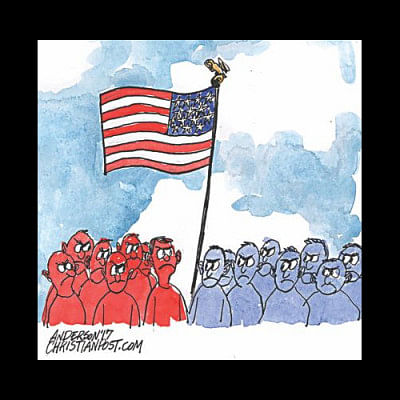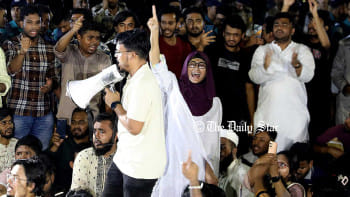Trump and a tale of two Americas

Midterms in America usually provide a perspective on how a president's first two years have impacted electoral sentiments. In 2018, Mr Trump energised his support base in the midterms, but he also inspired a large Democratic turnout. They have clawed back enough political leverage to create a situation in which he will have to tread carefully.
Trump aroused among his supporters a primal fear that immigrants were coming to take away their jobs, raising the threat of terrorism and putting their future at danger. He dispensed a huge pro-wealthy tax cut. He criticised European nations for exploiting the generosity of America and failing to meet their collective defence obligations. He intoned that the current dynamics of world trade have severely handicapped America and triggered a flight of jobs to other places: China, Europe, and so forth.
The strategy he followed propelled him to the White House and showed its effectiveness. In his two years he placed his trust in it. The Republican controlled Congress did little to address people's real concerns, and their popularity sank to a low. Trump's base stood behind him, although a segment of suburban voters, especially women, broke away and supported the Democrats. As midterms approached, the Republicans' general calculation was that the best chance to get elected was to remain tethered to Trump.
Trump recognised this reality. Feeling confident about his electoral oomph in the Republican-leaning states and districts, he campaigned with laudable energy and resolve in those areas. His calculus was to ignore the blue (Democratic) areas which he knew would stay with Democrats no matter what.
In the past incumbent presidents in the first term have seen their party in the House and the Senate lose in the midterms but they went on to win a second term regardless. Two good examples are Barack Obama and Bill Clinton.
Right now, volatility is brewing in the US political landscape. Once the president takes office, he is not the president of one party but of the whole country. His primary duty, historically observed by all presidents before, is to be a healer, to stabilise and unify. This paradigm, unfortunately, has atrophied alarmingly in recent decades.
Trump did not create the culture of partisanship. He embraced it and took it to a new depth. JFK in his inaugural address in 1961 famously said: "If a free society cannot help the many who are poor, it cannot save the few who are rich." Ronald Reagan, the Republican hero on whose watch communism dissolved in the former Soviet Union, pursued policies that won over a swathe of traditional Democratic voters. They came to be known as "Reagan Democrats". How distant that kind of idealism appears today when we look with agony at American politics…
Mr Trump's acrimonious standoff on November 7 in the White House press briefing with CNN's Jim Acosta highlighted his rift with the media once again. Acosta was asking him about immigrants, and whether the president worried about possible indictment from the Russia investigation. "You are a rude, terrible person," Mr Trump raged. Acosta was banned from appearing in White House briefings. CNN later sued the president and several of his aides and Acosta's press pass was restored after a federal judge ruled in CNN's favour.
The media across the spectrum rallied behind him. PEN America, a group that works for the protection of the free press, called the revocation of Acosta's press pass "a clear attack on the First Amendment." A free media is a fundamental pillar of democracy, and it channels people's sentiments. President Truman, when asked how a journalist should be tackled if he asks an awkward question, replied: "If you can't take the heat, get out of the kitchen."
After the midterms, Trump said that he hoped to cut bipartisan deals but threatened "war-like posture" if the House investigated him. He has vulnerabilities: non-disclosure of his tax returns, his family's business practices, alleged Russian interference in his 2016 campaign, and others. These are genuine issues on which Democrats should exercise their constitutional oversight role. But if he wants to be pragmatic and strike deals, as he may, they should cooperate.
Trump's hasty appointment of Matthew Whitaker, a critic of the Russia investigation, as acting attorney general after Jeff Sessions resigned was met with controversy. Even some Republican senators, notably Mitt Romney, said that the investigation should not be obstructed. The Democrats are asking Whitaker to recuse himself from overseeing the investigation.
Of the 100 women who are now in Congress, 60 are Democrats. For the first time two Muslim women and two African-American women have been elected. Trump's hostility to the demographic they represent and his demeaning rhetoric about women have something to do with their empowerment.
Whether or not Trump wins a second term, some of the things he has done will endure for a long time. He has pushed the Supreme Court far to the right by appointing two young conservative judges. The big tax cuts that have already doubled the deficit to over USD 1 trillion are another issue. He has brought immigration to the centre of debate.
The president has colossal power to shape the tone of engagement. His voice drowns out that of any other in America's political scene. It remains to be seen if he will realise that bitter polarisation that breeds hate crimes ultimately benefits neither him nor the nation.
America has historically played a laudable role on the world stage. The Marshall Plan revived war-ravaged Germany. Ronald Reagan played an instrumental role in the unification of Germany which is today a paragon of democracy. But Trump's policy is to pull America away from engagement with the world. His recent visit to Paris to commemorate the 100th anniversary of the end of the First World War did not go well. French President Macron pilloried Trump's self-definition as a "nationalist". He called nationalism "a betrayal of patriotism". An acerbic exchange followed between the two.
On the issue of climate change, he has threatened to end America's important role in combating global warming, thus creating widespread anxieties.
He tried to begin a constructive dialogue with North Korea and resolve that country's worrisome nuclear imbroglio. We have to see whether his initiative will deliver something good. Arguably, there has been some reduction of tension.
In the Middle East it is questionable whether the decision to move the US embassy in Israel from Tel Aviv to Jerusalem helps the cause of stability. His unilateral withdrawal from the P5+1 deal to curb Iran's nuclear programme has created discord with other signatories.
The atmosphere of angst has never been so acute in America. While the president and the two parties will seek to pursue their political goals, that should not come at the expense of peace. How American politics shapes up in the next two years is being anxiously watched by other nations. What happens in America radiates beyond its borders. Trump can do more than anyone else to set the right tone.
Ziaus Shams Chowdhury is a former ambassador of the Bangladesh government.





Comments